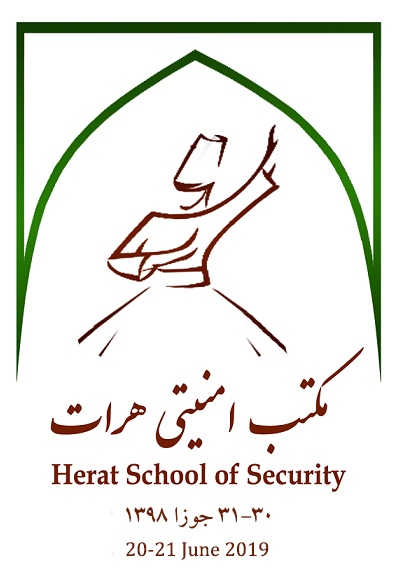Herat School of Security-II
Herat School of Security-II (HSS-II)
20-21 June 2019-Kabul, Afghanistan
The discipline of Security Studies has been challenged both in terms of its agenda and level of analysis. Traditional Security Studies is characterized by state-centrism and materialism. Critical approaches to security studies have challenged the narrowness of the military and state-centric nature of security studies and redefined its agenda. Of these critiques were widening and deepening agenda of security studies. On the one hand, the Copenhagen School of Security widened the security studies agenda from the military issues to include identity security, political security, societal security, environmental security, and economic security, and on the other hand, the Welsh School of Security Studies deepened the agenda of security studies from the state-centric to individual emancipation. Nonetheless, Security Studies is based on western-centric, parochial and false universalism which ignores the historical experience and path dependencies from outside the western world. So far Security Studies has not been able to accommodate the philosophical foundations in the East and as well as the different nature of security threats in these countries. Given the distinctive trajectory of the emergence of modern nation-state in the East, the nature of threats to these countries is different.
Despite the efforts of scholars in Africa, South America, East, West and South Asia for redefining security, less work has been done on the Central Asian and Persianate world. Central Asia has a rich treasure of classics such as Shahnamas, Siyasatnamas, Qabusnamas, Fututnamas, etc. which had been the principal guide for the states in this region and had been written by Wazirs (ministers), Princes, Court Clerks, Poets, Juris consults, historians and thinkers.
In 2015, Afghan Institute of Strategic Studies initiated a research programme under the title, Herat School of Security (HSS). HSS aims to introduce a security discourse that is based on ethics, individual cognizance and collective tolerance; the principles that our literature and mysticism have formed their foundations in addition to the fact that these principles have been the key to peaceful coexistence and cultural tolerance in our multicultural region. Within the framework of this programme, the first international Symposium on Herat School of Security was held in November 2015. The second international Symposium would be held on 21-22 June 2019. The proposed Symposium will seek to deliberate on three dimensions:
- Exploring new epistemological approaches derived from classic Persian works on politics such as Siyasatnama, and Persian and Pashto mystical and literary works.
- Presenting an alternative and multi-dimensional definition of security based on historical experience in Central Asian and Persianate world.
- Exploring the role of contemporary historians and intellectuals of Afghanistan in the conceptualization of politics and security from the non-western perspective.
By bring together poets, fiction writers, Islamic and Persian art scholars, jurists and literary scholars to converse/discuss with scholars from the disciplines of international relations, security studies, sociology, anthropology and history on questions such as: what are the classical texts in Persianate world to present a new epistemological foundation for non-western security studies? How can we use these classical texts to develop a non-western security theory? Can the traditionalist approach of security studies illustrate the security threat in Afghanistan and its surrounding region?
Some of the areas of focus of Herat School of Security will be:
- Conception of security and Politics in Eastern Perspectives
- Siyasatnamas, Shahnamas and the statecraft and security
- Conceptualization of politics, security, and peace in the mystical literature
- The Samanids, Safarids, Ghaznavids, Ghorids, and Timurids and the issue of statecraft
- Nizam ul Mulk and Siyasatnama
- Alberoni and research on society and politics
- Shahnamas and war and politics
- Qabusnama and Unsur al Ma’ali
- Imam Muhammad Ghazali and Nasihatul Mulik
- Baihaqi and Tārīkh-i Masʿūdī
- Teaching of Security Studies in Afghanistan’s Universities
- Experiences of Neighbouring Countries in non-western theory building
- Non-violent and peaceful political movements
- Legacy of Mahatma Gandhi, Khan Abdul Ghaffar Khan
- Peace and peaceful coexistence in Islamic jurisprudence
- The role of mosques in promoting a culture of peace and tolerance
- Contemporary Discourses of Peace in Islamic thoughts
The deadline for submission of abstracts is 20 May 2019. Please mail your abstracts, approximately 1,000 words, to hss@aiss.af. Contributors of selected abstracts will be contacted by the end of May, and full papers no longer than 8000 words including reference and footnotes are due by 10 June 2019.

